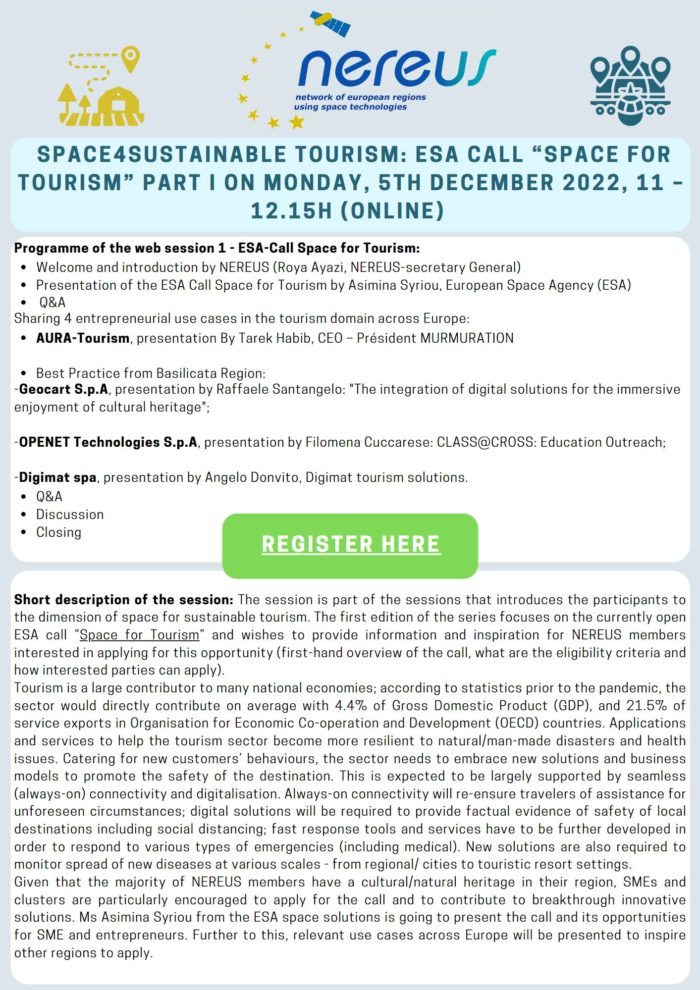On the 5th of December, 11.00-12.15 (Brussels time), NEREUS organises a webinar on sustainable tourism. The first edition of the series focuses on the currently open call “Space for Tourism” and wishes to provide information and inspiration for NEREUS members interested in applying for this opportunity (first-hand overview of the call, what the eligibility criteria are, and how interested parties can apply).
You can download the agenda here (link).
You can register here (link).
Tourism is a large contributor to many national economies; according to statistics prior to the pandemic, the sector would directly contribute on average with 4.4% of Gross Domestic Product (GDP), and 21.5% of service exports in Organisation for Economic Co-operation and Development (OECD) countries. Applications and services to help the tourism sector become more resilient to natural/man-made disasters and health issues. Catering to new customers’ behaviours, the sector needs to embrace new solutions and business models to promote the safety of the destination. This is expected to be largely supported by seamless(always-on) connectivity and digitalisation. Always-on connectivity will re-ensure travelers of assistance for unforeseen circumstances; digital solutions will be required to provide factual evidence of the safety of local destinations including social distancing; fast response tools and services have to be further developed in order to respond to various types of emergencies (including medical). New solutions are also required to monitor the spread of new diseases at various scales – from regional/ cities to tourist resort settings. Given that the majority of NEREUS members have a cultural/natural heritage in their region, SMEs and clusters are particularly encouraged to apply for the call and to contribute to breakthrough innovative solutions. Ms Asimina Syriou from the ESA space solutions is going to present the call and its opportunities for SME and entrepreneurs. Further to this, relevant use cases across Europe will be presented to inspire other regions to apply.
Target group: space clusters within and outside NEREUS, SMEs, companies, and all regional stakeholders interested in space businesses regarding the use of space technologies.
Here you will find the draft agenda for the next webinars related to tourism (link).
What is about:
Presenting the NEREUS space business community (space clusters, companies, SMEs): what are their expertise and best practices; what are their strengths? Cluster competencies; Enhancing collaboration and interlinkage amongst NEREUS private space community and regional space ecosystems (clusters, companies, etc) (moderated discussion); Providing an overview of the recent developments/trends and challenges in the European private space sector (EU projects, new trends, investment opportunities); Highlighting new funding EU/ESA funding opportunities (moderated discussion); Exploring how the private space sector can benefit the most from EU business initiatives (ESA BIC, Defence Fund) (moderated discussion);
Background:
The private space sector is one of the main players to boost the capitalisation of Europe’s space infrastructure. The increasing cooperation between the public and private sectors on many and diverse space domains, in particular, the downstream sector and the ongoing development of big and small private space players is vital for the future of the European space sector but also for an optimal cross-fertilisation with non-space sectors.
This online event will introduce the Network’s space clusters and companies active in a wide range of domains including agriculture, maritime affairs, R&D, and telecommunication. Moreover, it will explore potential partnerships within but also outside the Network as well as debate on new EU/ESA initiatives and funding opportunities. Private space business in regions is considered one of the most valuable topics for regional strategies, development and growth. In this context, NEREUS will provide its members with the necessary information on the topic and support this cross-cluster and cross-border collaboration.


